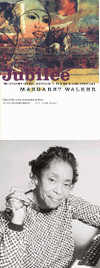

|

(WCAS35, H70) |
Required Reading
Margaret Walker Alexander (WCAS35, H70), who died last Nov. 30, has been hailed as one of the most influential African American writers of the century. "Margaret Walker's Jubilee [Houghton Mifflin paperback, 1999], Booker T. Washington's Up From Slavery [Random House paperback, 1999] and Richard Wright's Native Son [Harperperennial Library paperback, 1998] will never go out of print," predicts Chicago poet Marion Beach, a contemporary and longtime friend of Walker's. "I go to schools to read poetry and see children with Jubilee under their arms. It's required reading in middle schools across the country." Born in Birmingham, Ala., in 1915, Walker had a more privileged childhood than many of her contemporaries of color. Her father was a Methodist minister who preceded her at Northwestern. Before Jubilee, a story about the daughter of a slave and a white plantation owner, Walker (she did not use her married name for her works) attracted literary attention in 1942 when she became the first black writer to win the Yale Series of Younger Poets competition. She would later become a role model for generations of African American women like Chicago poet Angela Jackson (WCAS77). The two met at Northwestern in 1969, when Jackson was a student and Walker a visiting professor. "She made African American literature come alive," recalls Jackson. "She gave us a sense of its importance and richness. "What she did for me," the protégé adds, "was provide a realistic model of an African American woman writer. We all knew she had a husband [Firnist Alexander, whom she married in 1943] and children and had to grade papers, but she still managed to write poetry and her epic novel." Walker attracted worldwide attention in 1977 when she sued author Alex Haley for plagiarism. She claimed that his blockbuster Roots (Dell paperback, 1980) contained material "largely" copied from Jubilee. Haley countered that he had never read Walker's book, and the case was thrown out of court. She also made news in a lingering legal battle with another famous black writer, her former good friend Richard Wright, author of Native Son and Black Boy (Harperperennial Library paperback, 1998). Walker got permission, after many years, to use letters from him in her third book, a biography called Richard Wright: Daemonic Genius (Amistad Press paperback, 1993). "But she didn't go around looking for fights," says Jackson. "She was not so much feisty as determined and outspoken." A precocious child, Walker learned to read at an exceptionally young age and began writing poetry at 15 when she enrolled at Northwestern. After earning master's and doctoral degrees from the University of Iowa, she worked briefly as a social worker, newspaper reporter and magazine editor before settling into a 30-year teaching career in Jackson, Miss., in 1949. One of the first African American writers to return to her native South after establishing a national literary reputation, Walker taught at Jackson State University and founded the Institute for the Study of the History, Life and Culture of Black People. She served as its director for 11 years, and the center was later renamed for her. In Jackson, she was a much-honored citizen and lived on a street also named in her honor. -- E.B. |